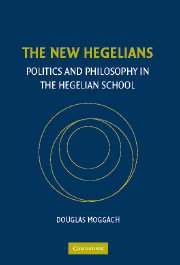Book contents
- Frontmatter
- Contents
- Acknowledgements
- Contributors
- Introduction: Hegelianism, Republicanism, and Modernity
- 1 Eduard Gans on Poverty and on the Constitutional Debate
- 2 Ludwig Feuerbach's Critique of Religion and the End of Moral Philosophy
- 3 The Symbolic Dimension and the Politics of Left Hegelianism
- 4 Exclusiveness and Political Universalism in Bruno Bauer
- 5 Republican Rigorism and Emancipation in Bruno Bauer
- 6 Edgar Bauer and the Origins of the Theory of Terrorism
- 7 Ein Menschenleben: Hegel and Stirner
- 8 ‘The State and I’: Max Stirner's Anarchism
- 9 Engels and the Invention of the Catastrophist Conception of the Industrial Revolution
- 10 The Basis of the State in the Marx of 1842
- 11 Marx and Feuerbachian Essence: Returning to the Question of ‘Human Essence’ in Historical Materialism
- 12 Freedom and the ‘Realm of Necessity’
- 13 Work, Language, and Community: A Response to Hegel's Critics
- Bibliography
- Index
12 - Freedom and the ‘Realm of Necessity’
Published online by Cambridge University Press: 22 August 2009
- Frontmatter
- Contents
- Acknowledgements
- Contributors
- Introduction: Hegelianism, Republicanism, and Modernity
- 1 Eduard Gans on Poverty and on the Constitutional Debate
- 2 Ludwig Feuerbach's Critique of Religion and the End of Moral Philosophy
- 3 The Symbolic Dimension and the Politics of Left Hegelianism
- 4 Exclusiveness and Political Universalism in Bruno Bauer
- 5 Republican Rigorism and Emancipation in Bruno Bauer
- 6 Edgar Bauer and the Origins of the Theory of Terrorism
- 7 Ein Menschenleben: Hegel and Stirner
- 8 ‘The State and I’: Max Stirner's Anarchism
- 9 Engels and the Invention of the Catastrophist Conception of the Industrial Revolution
- 10 The Basis of the State in the Marx of 1842
- 11 Marx and Feuerbachian Essence: Returning to the Question of ‘Human Essence’ in Historical Materialism
- 12 Freedom and the ‘Realm of Necessity’
- 13 Work, Language, and Community: A Response to Hegel's Critics
- Bibliography
- Index
Summary
The realm of freedom actually begins only where labour which is determined by necessity and mundane considerations ceases; thus in the very nature of things it lies beyond the sphere of actual material production. Just as the savage must wrestle with Nature to satisfy his wants, to maintain and reproduce life, so must civilized man, and he must do so in all social formations and under all possible modes of production. With his development this realm of physical necessity expands as a result of his wants; but, at the same time, the forces of production which satisfy these wants also increase. Freedom in this field can only consist in socialized man, the associated producers, rationally regulating their interchange with Nature, bringing it under their common control, instead of being ruled by it as by the blind forces of Nature; and achieving this with the least expenditure of energy and under conditions most favourable to, and worthy of, their human nature. But it nonetheless still remains a realm of necessity. Beyond it begins that development of human energy which is an end in itself, the true realm of freedom, which, however, can blossom forth only with the realm of necessity as its basis. The shortening of the working day is its basic prerequisite.
It is often argued that there are two conflicting strands in Marx's thought on work and freedom. In his early writings Marx maintains that, although work in contemporary society is an alienated activity, it need not be so.
- Type
- Chapter
- Information
- The New HegeliansPolitics and Philosophy in the Hegelian School, pp. 261 - 274Publisher: Cambridge University PressPrint publication year: 2006
- 1
- Cited by



